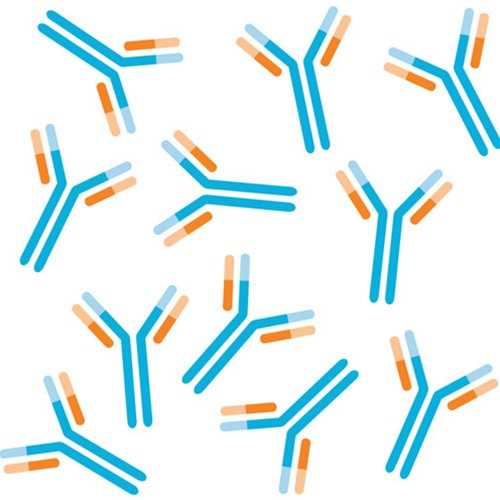Anti-Carboxypeptidase D Antibody
This rabbit IgG polyclonal antibody was generated against a multiple antigen peptide and recognizes human and rat carboxypeptidase-D (CPD).
Highlights:
- Reacts with human and rat CPD (epitope: HRLRQHHDEYEDEIR)
- Suitable for for Western Blot and Immunohistochemistry applications
Carboxypeptidase-D (CPD) is a 180 kDa membrane metalloproteinase that cleaves C-terminal arginine and lysine residues from its substrates. Arginine is transported into the cell and converted to citrulline and nitric oxide (NO) by the enzyme nitric oxide synthase. NO regulates many physiological processes in the cell and plays a role in some pathological processes, such as tumor progression, tumor invasiveness and tumor-induced angiogenesis.
From the laboratory of Catherine K. L. Too, PhD, Dalhousie University.
This rabbit IgG polyclonal antibody was generated against a multiple antigen peptide and recognizes human and rat carboxypeptidase-D (CPD).
Highlights:
- Reacts with human and rat CPD (epitope: HRLRQHHDEYEDEIR)
- Suitable for for Western Blot and Immunohistochemistry applications
Carboxypeptidase-D (CPD) is a 180 kDa membrane metalloproteinase that cleaves C-terminal arginine and lysine residues from its substrates. Arginine is transported into the cell and converted to citrulline and nitric oxide (NO) by the enzyme nitric oxide synthase. NO regulates many physiological processes in the cell and plays a role in some pathological processes, such as tumor progression, tumor invasiveness and tumor-induced angiogenesis.
From the laboratory of Catherine K. L. Too, PhD, Dalhousie University.
| Product Type: | Antibody |
| Alternative Name(s): | Metallocarboxypeptidase D, gp180 |
| Antigen: | Carboxypeptidase-D |
| Accession ID: | O75976 |
| Isotype: | IgG |
| Clonality: | Polyclonal |
| Reactivity: | Human and Rat |
| Immunogen: | Multiple antigen peptide |
| Species Immunized: | Rabbit |
| Epitope: | (AA sequence) HRLRQHHDEYEDEIR |
| Purification Method: | Affinity-purified |
| Method Used to Determine Concentration: | BCA assay |
| Buffer: | Anti-microbial borate buffered saline with 1% BSA |
| Tested Applications: | WB (0.5 µg/ml), IHC (2 µg/ml) |
| Concentration: | 0.46 ? 0.53 mg/mL |
| Storage: | -80 |
| Shipped: | Cold Packs (Domestic, Overnight); Dry Ice (International) |
- Too CKL, Vickaryous N, Boudreau RTM and Sangster SM (2001) Identification and nuclear localization of a novel prolactin and cytokine-responsive carboxypeptidase D. Endocrinology 142: 1357-1367.
- OMalley PGP, Sangster SM, Abdelmagid SA, Bearne SL and Too CKL (2005) Characterization of a novel, cytokine-inducible carboxypeptidase-D isoform in haematopoietic tumor cells. Biochemical Journal 390: 665- 673.
- Abdelmagid SA and Too CKL (2008) Estrogen and prolactin upregulate carboxypeptidase-D to promote nitric oxide production and survival of MCF-7 breast cancer cells. Endocrinology 149: 4821-4828.
- Thomas LN, Morehouse TJ and Too CKL (2012) Testosterone and prolactin increase carboxypeptidase-D and nitric oxide levels to promote survival of prostate cancer cells. The Prostate 72: 450-460.
- Koirala S, Thomas L.N. and Too CKL (2014). Prolactin/Stat5 and androgen R1881 co-activate carboxypeptidase- D gene in breast cancer cells. Molecular Endocrinology 28: 331-343.
- Thomas LN, Merrimen J, Bell DG, Rendon R, Goffin V and Too CKL (2014). Carboxypeptidase-D is elevated in prostate cancer and its anti-apoptotic activity is abolished by combined androgen and prolactin receptor targeting. The Prostate 74: 732-742.
- Thomas LN, Merrimen J, Bell DG, Rendon R, and Too CKL (2015) Prolactin- and testosterone-induced carboxypeptidase-D correlates with increased nitrotyrosines and Ki67 in prostate cancer. The Prostate 75: 1726-1736.
If you publish research with this product, please let us know so we can cite your paper.


